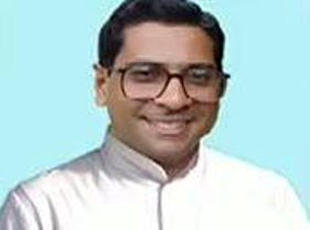Naxal-affected Jagdalpur diocese gets new Bishop
@@NEWS_SUBHEADLINE_BLOCK@@
 Vatican City/Kochi, July 17: Pope Francis has appointed Fr. Joseph Kollamparampil as the new bishop of Jagdalpur diocese that covers the Naxalites-infested Bastar area of Chhattisgarh state in Central India.
Vatican City/Kochi, July 17: Pope Francis has appointed Fr. Joseph Kollamparampil as the new bishop of Jagdalpur diocese that covers the Naxalites-infested Bastar area of Chhattisgarh state in Central India.
The new bishop replaces bishop Simon Stock Palathra, who retired after completing 75 years of age, according to an announcement made silultaneously at the Vatican and at the headquarters of the Syro-Malabar Church at Kochi in Kerala.
Fr. Kollamparambil is currently the rector of Samanvaya (Synthesis) Mission Theologate based at Bhopal, capital of Madhya Pradesh state. He belongs to the CMI’s Jagdalpur province.
Pope Francis has accepted the resignation of Bishop Simon Stock Palathara, CMI of India’s Jagdalpur diocese, from the pastoral governance of the diocese, according to Code of canons of Oriental Church.
Jagdalpur is the only diocese of the Syro-Malabar Church in Chhattisgarh and the Pope made the appointment on the request of the Oriental rite’s Bishops Synod.
The Diocese of Jagdalpur (Syro-Malabar), is in India’s Central Eastern state of Chhatisgarh, India. the diocese was elevated on 26 February 1977. It has 39,176 Square Kilometers (15,131 Square Miles). Of the 2,953,469 people, 8,483 are Catholics, which is about .3% of the total population. Besides the diocese has 112 priests and 451 religious.
Some 68 per cent of the people belong to tribal groups such as Muria, Maria, Halba, Bhatra, Dorla, Gond, Korava, Kol and Oraon. The rest belong to dalit and other backward communities.
The Catholics are mostly migrant Oraon tribal people from neighboring Raigarh diocese, employed in government and private sector or have settled down because of the availability of agricultural land.
The new bishop of Jagadalpur diocese Fr. Joseph Kouamparampil, CMI, was born on 26 November 1957 in Muthoiy, Kerala. He studied Philosophy at Dharmaram Vidya Kshetram, Bangalore, and theology at Jnana Deepa Vidyapeeth, Poona. He was ordained priest on 6 May 1985. After the ordination he pursued higher studies, obtaining a Masters in Theology from Dharmaram Vidya Kshetram (1985-1987) and a Doctorate in Systematic Theology from St. Thomas Aquinas University, Angelicum, Rome (1993-1996).
He served as Priest in charge and Manager of school in Jagdalpur (1987-1989); Parish Priest and Rector of Minor Seminary in Dugoli (1996-1999); Rector of Seminarians at Suman Ashram, Jagdalpur (1999-2002); Finance Secretary of the CMI Province Jagdalpur (2002-2005); Master of the Theology Students at Samanvaya Theological College, Kolchur, Jagdalpur (2005-2008).
He was also Chancellor of Jagdalpur Diocese and Convener for the Department of Catechism and Evangelization (1999-2008). From 2008 to 2011 he was Provincial Superior of the CMI Nirmal Province, Jagdalpur. From 2011 till date, he was Rector of the Samanvaya Mission Theologate, Bhopal.
Fr. Kollamparampil is the third bishop of Jagdalpur diocese that caters to the tribal-dominated region that is often in news for violent confrontations between Maoists and security forces. The 39,171-sq km diocese covers Chhattisgarh’s southernmost districts of Bastar, Bijapur, Dantewada and Kanker and Narayanpur.
In one of the worst incidents on May 25, some 250 Maoists attacked a convoy of Congress party leaders and killed some 30 people, including former state Home Minister Mahendra Karma and other top leaders of the Congress party.
Priests and nuns of the diocese say they work in one of the toughest missions in the world, walking tight rope between the Maoists who claim to wage a bloody war to liberate the oppressed tribal people and the security forces that are accused of killing innocent villagers under the pretext of controlling the ultras. However, the Naxalites have not attacked any church in the area or killed any nun or a priest so far.
On the contrary, they are often forewarned whenever the ultras planned any attack on security forces or politicians, the fact that leads to suspicion and doubts regarding any secret understanding between the Maoists and the Church authorities working in these areas.
The Catholic mission in the region began with the Society of the Missionaries of St. Francis Xavier, a Goa-based religious congregation, under the Apostolic Prefecture of Raipur, in 1966. The CMI priests took over the region in 1972 and Monsignor Paulinus Jeerakath became its first bishop in 1977.
When Bishop Jeerakath died in 1990 at the age of 70, Bishop Palathra, a pioneer of the Bastar mission, succeeded him.
The Church, which faces stiff opposition from rightwing Hindu groups, is mostly engaged in social and economic development of the people.
Although the region boasts of world-renowned iron ore mines, the villagers live in utter poverty and depend on agriculture, fishing, and collecting forest produce for their livelihood.
The literacy rate in the diocesan territory is only 26 percent, in contrast to the national average of 75 per cent. Only 16 per cent women in the region know how to read and write.
(Additioal inputs from agencies)